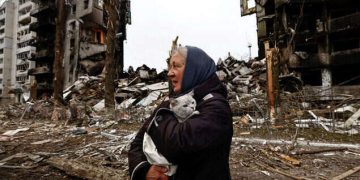HIDDEN under the shadow of an Ikea superstore, this so-called ‘caravan city’ reveals the stark reality of life for those without a home to even furnish.
Freezing in below-zero temperatures with no heating and working delivery jobs around the clock, residents in the dingy motorway layby say they have nowhere left to go after being priced out of the housing market in trendy Bristol.



With its historic cathedral, iconic Clifton Suspension bridge and rich tapestry of culture, the popular city attracts more than 21 million tourists each year.
But despite its picture-perfect attractions, it also has the highest number of caravan and vehicle dwellers in the country, an ugly reminder of the housing crisis afflicting thousands across Britain.
Last year, we reported on the sudden surge of van-lifers around Clifton Downs, which sparked a backlash from furious residents near the picturesque fields.
While council chiefs eventually cracked down on the estimated 600 to 800 living on roads around the area, another community closer to the city centre is growing larger by the day.
Many of the inhabitants of the new site at New Stadium Road, a cul-de-sac next to the busy M32, are gig economy workers who work endless hours for companies including Deliveroo and Uber Eats, locking up moped scooters next to ramshackle mobile homes.
A small number are Uber drivers, while a minority are local people who have fallen on hard times. A handful were revealed to be immigrants in breach of their visa conditions, following a raid on the site last year.
The conditions here are a stark contrast to those of the more cheerful Clifton Downs, with rubbish piled in corners and bottles of what appear to be urine leading to unpleasant questions about the apparent absence of toilet facilities.
Although you are legally allowed to park a caravan on the road, it is not legal to permanently live and sleep in one as this would require planning permission.
A chef and market stall trader who wanted to remain anonymous told The Sun: “I was living with two of my friends, then they got girlfriends and so I was forced out and had to find somewhere else to live. That was five years ago.
“I went viewing places, but they were out of my price range. I’d been paying £550 plus bills.
“My budget for a new place was about £700, and I wanted to get a place by myself, but as soon as I started looking, I realised that just wasn’t going to happen.
“One flat I went to view, an agency invited everyone at the same time. There were 35 people, and even though it was damp and mouldy, as soon as someone made an offer someone would offer more.
“From that moment I knew I wouldn’t be able to find a place in Bristol. That night I went and bought a caravan.
“I would have been homeless if I didn’t buy a caravan because I only had three days left.
“I stay here just because we haven’t been moved on. Other places you just get moved on every three or four weeks by the council.
“It’s good for me for work, as I just work down the road.”


Freezing conditions
On the day The Sun visited, temperatures were just 3°C in the middle of the day, having dropped well below freezing the night before.
The man admits: “In the winter it’s really cold. I’m lucky to have heating, but I’ve got three friends who live here, English lads, and they don’t have any heating.
“They manage by wearing two tracksuits and having two blankets, you wake up and your nose is ice cold, but the rest of you is warm.
“I spend between £50 and £150 on gas, depending on the month, but that’s significantly less than living in a house. I’m saving money now, whereas before I was living cheque to cheque.
“I’m saving for a business, I want to start my own business, so hopefully won’t be living here forever.”
Tale of two cities
By Julia Etherington
The tales of two caravan cities in different parts of Bristol are poles apart.
Surrounded by opulent homes, the caravan dwellers near Clifton Downs are mainly from professional backgrounds.
Some have made homes from old horse boxes or converted vans, with all the mod-cons, soft furnishings and even working baths.
The dwellers are mainly happy in their chosen lifestyle, even if the cost of rent was the catalyst for squeezing them out of the bricks and mortar they were used to.
The atmosphere there is friendly, the neighbours are chatty and it has a community feel of ‘everyone is in the same boat’. They take pride in their surroundings, cleaning up rubbish and keeping the outside of their homes clean and tidy.
Bristol Council has tried to move them on, but it’s such a nice spot, they inevitably come back.
Walking through the second site at New Stadium Road felt eerie, like I was walking through a shantytown tainted with desperation and sadness.
Rubbish littered the surrounding mounds of dirt. Old, tatty-looking caravans were almost in a state of disrepair.
While the neighbours do talk to each other and do have a community, it seems most of the South American men there must surely be missing a family back home, who they were probably providing for.
Those we saw had a look of fear and resignation, the opposite of the hope and aspiration belonging to the people on the Downs.
At the bottom of the dead-end road is a city council waste disposal and pet control site, although there are no means of waste disposal for its neighbouring caravan dwellers.
Rubbish fluttered around, while bottles of what looked like urine were standing behind some of the vans, many of which did not have heating.
Most of the people are living in poverty, without running water, showers or even heating. Knocks on the door go unanswered, although curtains twitch.
It’s clear that some of the workers fear that one day, the knocker will be from immigration officials, who could pull the rug from under them and end their means to provide for their loved ones back home – either temporarily or for good.
Bristol is the most expensive city in the UK to live in, outside of London.
Many people are sympathetic to the plight of the people who have no choice but to live next to the underpass and work tirelessly, getting paid per delivery, so often earning below the minimum wage of £11.44.
Dot Wilcox lives two miles away from the site and regularly passes through on her way to the Tesco supermarket and other shops on the other side of Ikea.
She said: “I come here regularly, and the site has definitely grown in the couple of years, but you don’t see many people because I guess they’re usually out working.



“I don’t feel unsafe travelling through here, although I wouldn’t come here at night.
“There are lots of caravans everywhere in the city now, but I’m not sure this one’s an eyesore as it’s not a place of beauty anyway – it’s a car park and a derelict road, so I don’t think it’s spoiling the place.
“The thing is, people have to live somewhere, and I know of at least three caravan sites like this in the city, but they’re not really near any houses, apart from the one at Clifton Downs, which probably isn’t very nice for some people.
“If they’re here working, I can’t see any problem with it and hope they are left alone.”
‘Rubbish everywhere’
But there are houses a stone’s throw from the site, and the people who live nearby are so angry they even set up a residents’ action group, meeting with local police officers and complaining to the council.
None of those wanted to be named or identified for fear of reprisals, but shared their complaints anonymously.
One woman told us: “There have been people living in caravans for a number of years, but it’s grown a lot.
“There is rubbish everywhere, the noise from the motorbikes all night is too much and the whole place is a mess. They have to live somewhere but this is right on our doorstep.
“We’ve complained to the police and the council, but they don’t seem to care, and nothing gets done about it.”
Bristol's housing crisis
Bristol City Council launched The Living Rent Commission two years ago to look at options for tackling the rent crisis in the city.
It found 134,000 people, almost a third of the city’s population, were renting.
Over the previous decade, private rents in Bristol increased by 52 per cent, while wages only rose by 24 per cent.
On average, Bristol residents now need almost nine times their annual salary to buy a house.
The Commission worked with 150 renters in Bristol, whose accounts paint a grim reality.
It read: “A quarter of the comments referred to feeling powerless or a lack of security. Searching for or keeping accommodation creates a lack of security and raises anxiety levels. The testimonies convey a sense of urgency, frustration and sometimes despair among tenants. The most prominent concern is the significant increases in rent.”
Over half of survey respondents said they had issues with repairs and maintenance, most commonly reporting damp, mould and plumbing problems, which landlords were often unwilling to address.
Another issue was rent bidding, where landlords or letting agents ask prospective tenants to bid higher than the advertised rent. Over a quarter of respondents taking on a new tenancy said they had been asked to take part in bidding wars.
This situation is, put simply, a supply and demand issue.
Like many places, especially in the South West of England, landlords have chosen to make holiday lets of their rental properties, with 1,500 listed on Airbnb alone.
Other landlords are growing wary of new rules and taxes, and therefore selling properties, taking them out of the rental pool.
Currently spareroom.com shows a bedroom in a house share costs upwards of £700, while rental of a small flat costs more than £1,100.
The average salary of Bristolians working full-time is £38,990 a year, with a take-home wage of £2,545 a month.
The housing crisis means people are struggling to find themselves in a position to have children, stay in their home city close to family and friends or a support network, according to reports.
Another neighbour claims: “It’s a nightmare to be honest. There’s noise all hours of the day and night and I’ve even witnessed drug deals happening.
“Some of the people living there are just doing their jobs and are hard-working, honest people, while others are dealing drugs.
“We can’t leave bikes at the front of our property because they’ll get stolen, and some nights there are large gatherings beneath the underpass.”
In October Immigration Enforcement carried out a raid at the New Stadium Road site, where there are currently more than 35 caravans.
The Home Office said 13 people had overstayed their permitted leave, two were in breach of their visa conditions and two had breached their immigration bail conditions.



It detained 13 people, pending potential removal from the UK.
The four people who were not detained have been placed on immigration bail and are now required to report regularly to the Home Office.
Immigration Enforcement’s Director of Enforcement Eddy Montgomery said the operation “sends a clear message to those who seek to exploit the labour market to employ workers illegally, and those who believe they can work here without the
correct status”.
Locals told The Sun their caravans were also removed from the site after the raid but have since been replaced by others.
A spokesman for Avon and Somerset Police told The Sun: “We work closely with partner agencies, including Bristol City Council and businesses, to tackle issues around antisocial behaviour across the city.
“We are not aware of there being a significant increase in antisocial behaviour in New Stadium Road being reported to us in recent months.
“Where crimes have occurred, including drug offences and theft, officers have responded and arrests have been made where appropriate. However, the number of reported crimes is not believed to be disproportionate to other surrounding areas.
“The area is often patrolled by members of the local neighbourhood team, who also regularly meet with partners to discuss a wide range of topics that may may impact on communities. In light of the concerns raised to the media around New Stadium Road, the matter was mentioned at a planned partnership meeting on Monday 27 January to ensure joint awareness.
“We are conscious that sometimes issues go unreported and therefore we encourage anyone who experiences antisocial behaviour in their area to please make the relevant authority aware.
“The information we receive is analysed to help officers plan the most effective areas for them to carry out patrols, which helps reduce issues and prevent criminality.
“Antisocial behaviour can be reported on 101 or via our website. If a crime is in progress, please call 999.”
The Sun has approached Bristol City Council for comment.




























